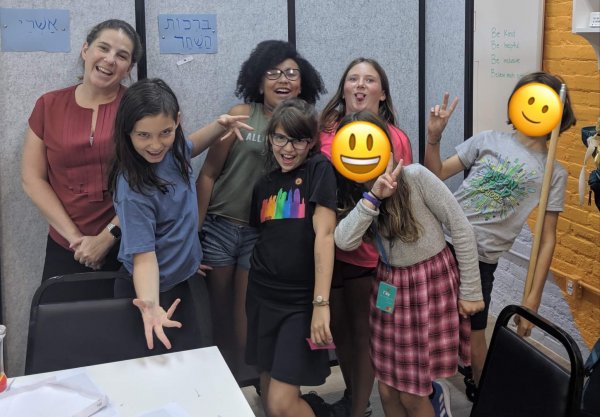
What does becoming a BMitzvah mean to us? How do we innovate on rituals that have existed for hundreds or thousands of years? What do we keep and what do we change? Our BMitzvah cohort has been tackling some hard questions in our first month of classes and having a lot of fun as well!
Every day in BMitzvah, we spend time working on Rosh Pinah (cornerstone or chief stone) projects. Our first projects focused on the BMitzvah ritual, which is not as old as we thought! The earliest recorded BMitzvah ceremony was only about 750 years ago. We learned about the history of BMitzvah, bringing in Makom Community member and museum curator Ivy Weingram to share her knowledge about Bat Mitzvah!
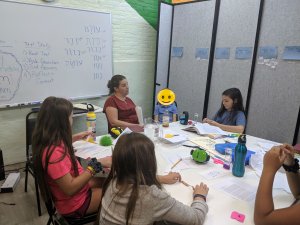
Ivy asked us the question: “What things are now innovations that may become expectations in the future?” Our answers to this question ranged from having a woman president and more Muslim people in government to having flexible solar panels on our hats powering our cell phones!
We brought our innovative thinking to the four main historic parts of a BMitzvah ritual:
- The parent’s blessing: the parent(s) of the BMitzvah traditionally recite this blessing: “Praised are You, Adonai our God, ruler of the universe who has excused me (from being liable) for this one (meaning, the child).” Ronia wrote a new parent’s blessing that allows the parent to address their child directly and express their hopes for the future:
“Bless God, Spirit of the World, and ask her to glorify this new light that is entering the world, and blessings and lovingkindness upon you, my child, that you may invite the whole world to bask in your glow.”
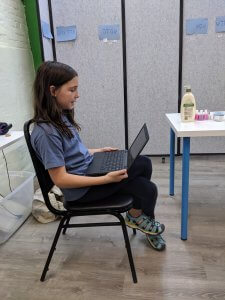
- The drash: a speech centered around the weekly Torah portion, which could be considered a daunting task. We learned from Michael Hilton’s Bar Mitzvah: A History that by the late 1500s some bar mitzvah students were avoiding this responsibility by paying their tutors to write their speeches for them. Our BMitzvah students instead took on this challenge with more innovation. Leo modified the drash to center around contemporary text. His example focused on the book Equal Rites by Terry Pratchett, talking about contemporary issues of gender equality.
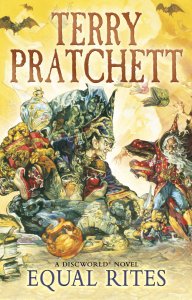
- The celebratory meal or party: what began as a meal has become, in many Jewish communities, an extravagant and costly party. Remi and Drew decided to create a different kind of ritual for the celebration, a solitary time to reflect on your new responsibilities and privileges as a young adult. They presented a sample ritual complete with new foods you might try as an adult, a wine bottle (full of gummy candy) to contemplate other milestones to come like saying Kiddush with real wine, a tzedakah box to give back, and a spa section to treat yourself well!
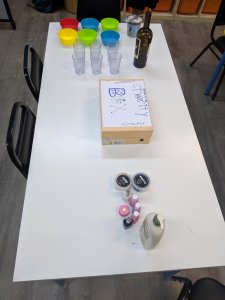
- Blessing and Reading the Torah: a tough one to innovate. Zoey and Zahdi took it on with the intention of making the stories in Tanakh come to life, through the power of the musical! They decided to innovate the ritual further by allowing the BMitzvah to choose from any compelling section of Tanakh, not just Torah. They chose Judges 4:21-22 for their example, the story of Yael’s triumph over Sisera, and wrote a mini-musical!

Some of our BMitzvah cohort are already thinking about incorporating these modifications into their BMitzvah ceremonies. We can’t wait to see what other ideas they dream up!
